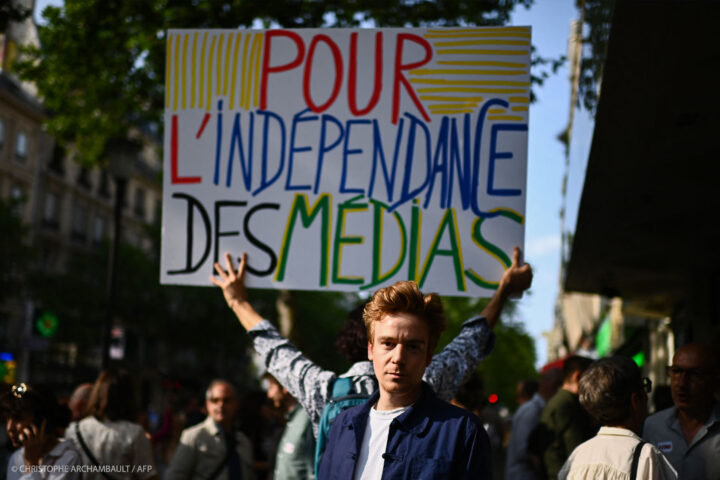President Nicos Anastasiades believes there are “orchestrated attempts to tarnish” him after the chief editor of a leading newspaper said he was forced to resign after claiming the Cypriot leader’s family law office benefitted immensely from the ‘golden passports’ scheme.
Veteran journalist Andreas Paraschos, Managing Editor of the weekly Cyprus edition of Kathimerini since 2008, quit on Wednesday after the publishers demanded a retraction of his column.
Paraschos alleged in his column that during an evening of merriment in Athens, the President had privately claimed his firm earned €300 mln [a year] and these funds were shipped to the Seychelles on private flights.
Although published in the print edition, the column was taken down from the Kathimerini Cyprus website.
The former editor later said that his only regret was writing “a year” and that he did not specify that the conversation took place in front of former Prime Minister Alexis Tsipras, and that political party leaders in Cyprus were aware.
The Cyprus News Agency said it contacted Tsipras who refuted such a conversation ever taking place.
However, in his resignation letter, published by daily Politis, Paraschos continued with the allegations, referring to “a country where the President of the Republic declares that his law office in Limassol secured 57 passports, but wonders ‘Where is this unethical?’”
“In the summer of 2017 [the President] said he would investigate and respond to my information that his office had produced by then 253 ‘golden passports’, but I never got a reply.
“In the same country where when asked about the Al Jazeera revelations, the President said ‘everyone would go to hell’.”
Passports for cash
The cash-for-passports scheme, officially known as the ‘Citizenship by Investment Scheme’, was halted in November after a documentary exposé by broadcaster Al Jazeera last summer named and shamed the Speaker of the Cypriot parliament and a leading MP for their alleged roles in assisting a fake fugitive from China benefit from the passports scheme.
Both resigned and sparked a public outcry aimed at politicians from all ideological backgrounds who have tolerated corruption, culminating with the “sale” of Cyprus citizenship.
The scheme contributed up to €9.7 bln in direct and indirect contributions since 2013 and came under fire from international media and the EU after Cyprus granted passports to financial fugitives. In October, it rescinded 7 of these passports.
Heavy criticism at home and abroad, said Cyprus was not stringent enough in its vetting process.
The CIS programme, the darling of accountants, lawyers and property developers, required an investment, mainly property, of at least €2-2.5 mln plus tax.
Investors also had to pay a €150,000 application fee to the state with the money earmarked for low-cost housing and innovation.
An ‘economic impact assessment’ of the CIS programme, conducted by advisory firm EY, showed that throughout the programme a mere 6% (about €567 mln) of foreign investments in Cyprus ended up in state coffers in fees and taxes, and a further 2% (€211 mln) in the national pension fund.
More than two-thirds of the investment funds lined the pockets of property developers, who were on the brink of bankruptcy.
In a statement on Thursday, President Anastasiades said his tolerance of media criticism has been misunderstood by some who, “with malicious and false publications or rumours consider they offer a good service to the country and the people.”
He said he has been “following with sadness the orchestrated attempts to tarnish my name through rumours or false reports.”
Anastasiades called on his “journalist friend Andreas Paraschos to either substantiate all the unfounded (information) in his recent column or to admit that he was the victim of misinformation.”
The Cyprus Journalists’ Union was not lenient on the country’s chief executive saying he should disassociate himself from “the final depressing outcome of this whole incident.”
It fully supported Paraschos, calling it a blow to freedom of the press and the forced resignation of a journalist.
It added that Kathimerini’s publishers “proceeded with an apology” on Paraschos’ behalf and in his absence.
“This whole event has wounded the freedom of expression and the free press in our country.
Sad, worrying, and dangerous
“This whole event is sad, worrying, and dangerous. It leaves exposed the publishers-employers and in particular the presidential environment.”
“When public opinion screams about the corruption exposed by foreign media, the Cypriot journalists cannot stay silent. But journalists, too, are judged,” the union said.
The newspaper said its publisher and legal counsel had asked Paraschos about proving these allegations against the President, to which they said he hadn’t, but that “someone had told him”.
This, the publishers said, “left the newspaper and himself legally and ethically exposed,” and added that “if he had sufficient proof about the allegation, the newspaper and its management would fully support him.”
They also added that “we have not received any intervention from others” and the newspaper “is obliged to have proof, when it exposes scandals and not just based on hearsay.”










